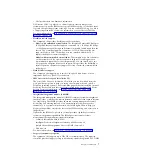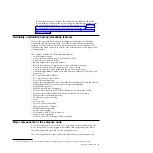
an unsafe condition, you must determine how serious the hazard is and whether
you must correct the problem before you work on the product.
Consider the following conditions and the safety hazards that they present:
v
Electrical hazards, especially primary power. Primary voltage on the frame can
cause serious or fatal electrical shock.
v
Explosive hazards, such as a damaged CRT face or a bulging capacitor.
v
Mechanical hazards, such as loose or missing hardware.
To inspect the product for potential unsafe conditions, complete the following
steps:
1.
Make sure that the power is off and the power cords are disconnected.
2.
Make sure that the exterior cover is not damaged, loose, or broken, and observe
any sharp edges.
3.
Check the power cords:
v
Make sure that the third-wire ground connector is in good condition. Use a
meter to measure third-wire ground continuity for 0.1 ohm or less between
the external ground pin and the frame ground.
v
Make sure that the power cords are the correct type.
v
Make sure that the insulation is not frayed or worn.
4.
Remove the cover.
5.
Check for any obvious non-IBM alterations. Use good judgment as to the safety
of any non-IBM alterations.
6.
Check inside the system for any obvious unsafe conditions, such as metal
filings, contamination, water or other liquid, or signs of fire or smoke damage.
7.
Check for worn, frayed, or pinched cables.
8.
Make sure that the power-supply cover fasteners (screws or rivets) have not
been removed or tampered with.
Guidelines for servicing electrical equipment
Observe these guidelines when you service electrical equipment.
v
Check the area for electrical hazards such as moist floors, nongrounded power
extension cords, and missing safety grounds.
v
Use only approved tools and test equipment. Some hand tools have handles that
are covered with a soft material that does not provide insulation from live
electrical current.
v
Regularly inspect and maintain your electrical hand tools for safe operational
condition. Do not use worn or broken tools or testers.
v
Do not touch the reflective surface of a dental mirror to a live electrical circuit.
The surface is conductive and can cause personal injury or equipment damage if
it touches a live electrical circuit.
v
Some rubber floor mats contain small conductive fibers to decrease electrostatic
discharge. Do not use this type of mat to protect yourself from electrical shock.
v
Do not work alone under hazardous conditions or near equipment that has
hazardous voltages.
v
Locate the emergency power-off (EPO) switch, disconnecting switch, or electrical
outlet so that you can turn off the power quickly in the event of an electrical
accident.
v
Disconnect all power before you perform a mechanical inspection, work near
power supplies, or remove or install main units.
Safety
vii
Summary of Contents for Flex System x440 Compute Node
Page 1: ...IBM Flex System x440 Compute Node Types 7917 and 2584 Installation and Service Guide ...
Page 2: ......
Page 3: ...IBM Flex System x440 Compute Node Types 7917 and 2584 Installation and Service Guide ...
Page 34: ...22 IBM Flex System x440 Compute Node Types 7917 and 2584 Installation and Service Guide ...
Page 50: ...38 IBM Flex System x440 Compute Node Types 7917 and 2584 Installation and Service Guide ...
Page 68: ...56 IBM Flex System x440 Compute Node Types 7917 and 2584 Installation and Service Guide ...
Page 498: ...486 IBM Flex System x440 Compute Node Types 7917 and 2584 Installation and Service Guide ...
Page 570: ...558 IBM Flex System x440 Compute Node Types 7917 and 2584 Installation and Service Guide ...
Page 578: ...566 IBM Flex System x440 Compute Node Types 7917 and 2584 Installation and Service Guide ...
Page 583: ......
Page 584: ... Part Number 81Y1144 Printed in USA 1P P N 81Y1144 ...










































